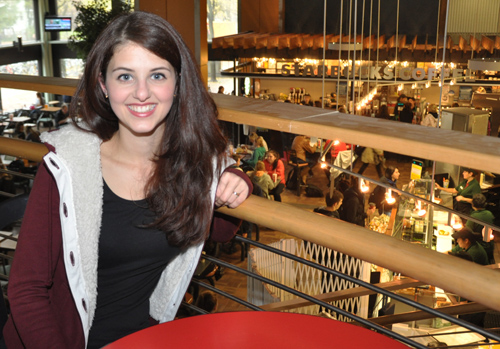
Students looking to broaden their academic horizons can add the University of Bremen to their itinerary. The university in northwestern Germany was recently named International University 2012 and awarded €50,000 ($65,700 CAD) by the German Academic Exchange Service for best support of foreign students.
“They beat out a lot of competition for this,” says Don Bruce, dean of U of G’s College of Arts, who has been building bridges with Bremen since 2011. “They will use the €50,000 prize to improve their operations for foreign students.”
The Bremen-Guelph partnership began in 2011 with several visits between the two universities. “It seemed like there were some good possibilities,” says Bruce of the partnership. During his four-week trip to Bremen in early 2012, representatives of both universities signed a memorandum of understanding (MOU). Bruce was later joined by Prof. Alun Joseph, Department of Geography, who also aims to broaden U of G’s international relations.
Guelph has many memoranda of understanding with universities around the world, says Joseph, and these partnerships often begin with a personal connection between faculty members from both universities. “What a lot of universities have been trying to do is develop core partnerships,” he says, and U of G is interested in collaborating with more universities in Europe, Latin America, Asia and Africa. In Europe, Guelph’s closest ties are with universities in the United Kingdom, France and Germany. Adds Joseph: “Germany has always been very positive about linkages. German universities have always been outward-looking. They like exchange programs. They like to be linked internationally.”
Broadening and deepening these relationships is U of G’s ultimate goal. The ideal partnerships would combine faculty and student exchanges, research initiatives and joint programs. “The agreements that have been the most active have had more than one component and people who have stuck with it,” says Joseph, referring to the personal commitment required by both sides. “It became obvious that Bremen was a good possibility. It’s all based on reciprocity: what they can do for us and what we can do for them.” U of G is more focused on the second half of that equation, he adds. Being a good partner makes the other partner want to do the same.
Before the MOU was signed, Bruce was already working with a research group at Bremen studying links between science and literature. He also helped the university with a humanities research grant proposal to the Volkswagen Foundation. “It was a means of demonstrating to them that we wanted to work with them,” says Bruce, who also helped with Bremen’s application for an excellence designation. Bremen is one of only 11 universities in Germany to have earned the title, which brings €100 million ($132 million CAD) in additional government funding over five years.
Bruce and Joseph returned to Bremen in early December to discuss potential joint programs. They were accompanied by Profs. Jerry Chomyn, head of media studies at the University of Guelph-Humber, and John Kissick, director of U of G’s School of Fine Arts and Music.
Partnering with European universities offering similar programs as those at Guelph helps facilitate student exchanges, says Bruce. The European studies program at Guelph, for example, focuses on culture, literature and history, while Bremen’s program stresses politics and economics, making them complementary for students who study at both universities.
“What we’re aiming at is deepening the relationship,” says Bruce, adding that it needs to be built on a personal and professional level. Once the humanities partnership has been developed, adds Joseph, U of G will look at strengthening ties in other areas, such as social sciences. “The key thing about internationalization is getting students working together and researchers working together,” he says. “The only way you can see the value in what you do is by understanding what other people do and how other people see things.”